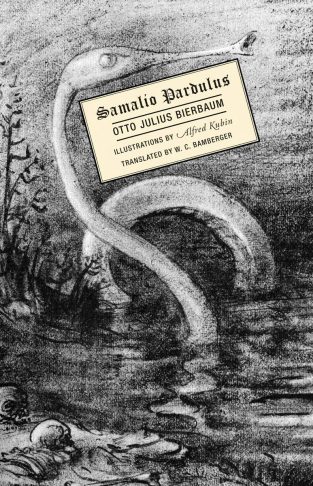 By OTTO JULIUS BIERBAUM (Wakefield Press; 1908/11/2019)
By OTTO JULIUS BIERBAUM (Wakefield Press; 1908/11/2019)
A most fascinating excavation, this long-forgotten early twentieth century gothic novella by a German poet appears here in its first-ever English version. W.C. Bamberger did the translation honors, and quite ably, capturing a peculiarly Germanic sense of pre-expressionist poetic morbidity. The book also contains the sketchy black and white illustrations from the 1911 German edition by the incomparable Alfred Kubin, who seems the ideal person to illustrate this text.
The title character is a grotesquely ugly Italian artist whose overriding goal is to “be alone and to create around himself a new world of forms from his imagination.” The ensuing events are related from the point of view of Messer Giacomo, a painter engaged in a meeting with Pardulus, who as Giacomo’s shocked account begins is ensconced in a secluded castle, ranting about the death of God and the solace of insanity. Among other outrages, Pardulus prefers the night to the daytime, painting only in nocturnal colors, and harbors an incestuous attraction for his sister.
Pardulus also claims he’s visited nightly by “spirits,” and this would appear to be proven by a ghostly horseman that rides up to the home of Pardulus’s parents each night. The target of the visitations is Pardulus’s sister, who’s repeatedly violated by a succubus summoned by her brother, a climactic visit to whom yields further horrors, and a final fateful revelation: “Art is the worst snare of evil.”
In this novella narrative clarity takes a backseat to thematic audacity. The ranting about God and madness that takes up much of the opening third showcases a concern with the divine that elevates this slight tale far above its modest conception and length (a scant 67 pages, nearly half of which are taken up with Kubin’s illustrations). Equally important is the author’s descriptive acuity, which yields memorable descriptions like “It was as though the sound did not float through the air, but came sliding down his lips, running down over his chin and his chest, dripping down the chair to the carpet…”
A lost masterpiece? Not quite. SAMALIO PARDULUS will never come close to displacing LES CHANTS DE MALDOROR or THE OTHER SIDE in anyone’s affections, but it is a memorable exercise in gothic decadence, hailing from a time in which those words had real meaning.
